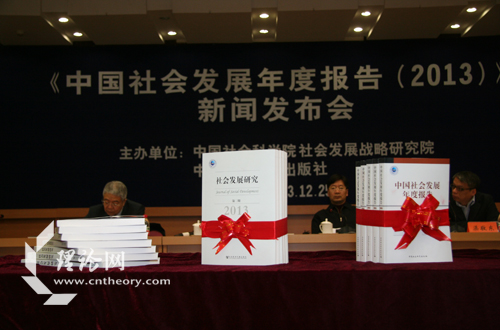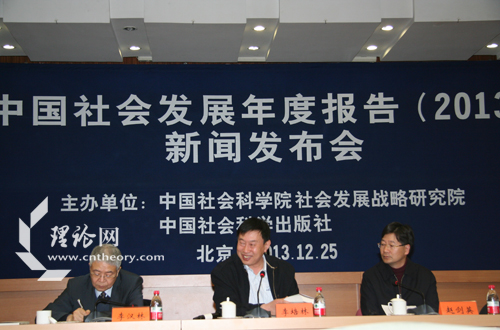 home > News & Announcements > Photo News
home > News & Announcements > Photo News"China’s Social Development Annual Report (2013)" was released in Beijing


The Institution of Social Development, CASS and China Social Sciences Press held a press conference in the afternoon on December 25th, and jointly published the "China Social Development Annual Report (2013)." The vice President of CASS, Mr. Peilin Li, the editor in chief and President of China Social Sciences Press, Jianying Zhao, and the President of Institute of Social Development, Researcher Hanlin Li, attended the meeting.
A survey named “Social Attitudes and Social Development Survey (2013)”was conducted by the ISD in May, 2013. 60 cities/towns and 540 communities/neighborhoods from 31 provinces and 1223 cities were selected by multiple random sampling. The survey included aspects of social climate, social inclusion, public participation, urban public services, social management, life quality, and trust in government.
"China Social Development Annual Report (2013)" includes eleven reports, which were “Social Climate Report” ,“Social Inclusion Report”, “Public Participation Report”, “Inclusiveness of Urban Public Services Report”, “The Social Inclusion and Balanced Development In Regional Societies-A Cases Study of Xishuangbanna”,”Social Management Report”, “Government Social Responsibility Report”, “The Life Quality Report for Urban Residents”, “Social Development Index and Chinese Development Stage Report”, “Trust in Government Report” and “Environmental Satisfaction Report”.

The score of social confidence was 77.4 in 2013, 2.4 higher than 2012, showing a rising public expectation on social development in the next three years. Satisfaction at the individual level was higher than satisfaction at the societal level. The three highest scores of satisfaction were on family relations, interpersonal relations and health conditions at the individual level, whereas the three lowest scores of satisfaction were life stress, income level and housing conditions. At the societal level, the three most satisfying aspects were the infrastructure, education and public security. The three most dissatisfying aspects were the price, food safety and environmental quality.
The report on housing indicated that housing was a major cause of income stress and living stress. Statistics showed that 15.6% of the respondents rent homes. The number was 45.4% for respondents below 30 yrs. and 70% for respondents between 30 yrs. to 40 yrs. Young people were facing the shortage of houses.
The result of the environmental satisfaction showed that air quality, water quality, ecological water quality, urban greening, and garbage disposal were most impressive aspects. The lowest score of satisfaction was 52.19 for the air quality.
The public concern had been transferred to the macroeconomic situation, social and political participation and social justice. It seems that China’s social development may have reached a “turning point”, from the basic needs of social development of the low income stage to a higher level of needs of social development of the middle income stage.
Xicheng District, Beijing
Fax: (86 10) 010-68530989







